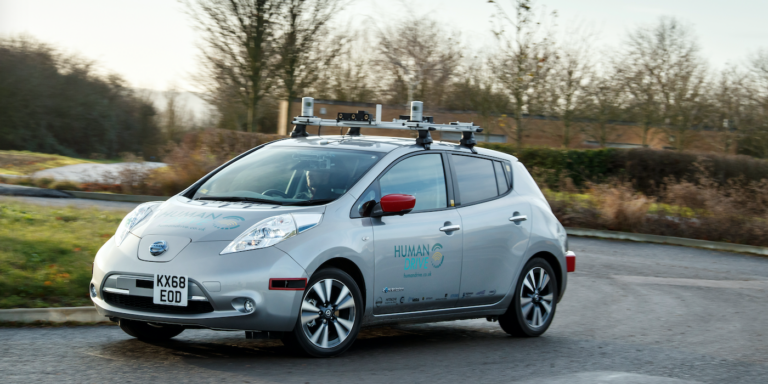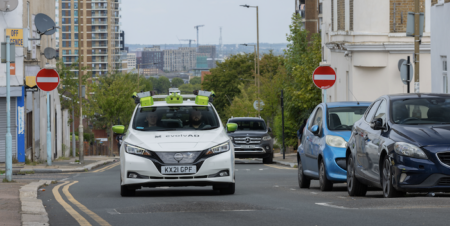HumanDrive, a UK-based research project into autonomous vehicle (AV) technologies, has reported the successful completion of a 230-mile (370km) self-navigated journey on British roads, from Cranfield, Bedfordshire to Sunderland. The trial, named ‘Grand Drive’ used advanced positioning technology and followed a test track-based activity that explored human-like driving using machine learning. The achievement was the culmination of 30 months’ work by the HumanDrive consortium – a team led by Nissan engineers in the UK, working in partnership with a consortium of expert companies.
One of the key aspects of the project was to develop an advanced, autonomous vehicle control system with dynamics characteristics that create a comfortable and familiar experience for occupants. The journey involved a range of driving scenarios including negotiating country lanes with no or minimal road markings, junctions, roundabouts and motorways. The autonomous technology activated along the route to change lanes, merge and stop and start when necessary.
The Grand Drive test vehicle was a Nissan LEAF featuring GPS, radar, LIDAR and camera technologies that build up a perception of the world around it. Using that perceived world, the system can make decisions about how to navigate roads and obstacles it encounters on a journey and respond with a natural, human-like driving style. The £13.5m HumanDrive project is jointly funded by UK government through the Centre for Connected and Autonomous Vehicles (CCAV) and Innovate UK, and nine other consortium partners.
Bob Bateman, project manager for Nissan Technical Centre Europe commented, “The HumanDrive project allowed us to develop an autonomous vehicle that can tackle challenges encountered on UK roads that are unique to this part of the world, such as complex roundabouts and high-speed country lanes with no road markings, white lines or kerbs.”
HumanDrive and Machine Learning
The second, track-based part of the HumanDrive project looked at how machine-learning Artificial Intelligence (AI) technologies could enhance the user experience and passenger comfort of connected and autonomous vehicles. The pilot vehicles tested on private tracks also incorporated AI systems developed by consortium member Hitachi Europe, which enable real-time machine-learning. By building a dataset of previously encountered traffic scenarios and solutions, it can use this ‘learned experience’ to handle similar scenarios in future and plot a safe route around an obstacle.
These technologies were subjected to a testing process and developed using a range of facilities, including simulation, hardware in the loop, and private test tracks.
The HumanDrive research also focused on advancing cybersecurity features in AD vehicles, developing testing and safety methodologies for UK AD testing and investigating the implications of AD vehicles on the wider transport system.
HumanDrive and Nissan
According to Nissan, while remaining a UK-based research project for now, the lessons learned from HumanDrive will help inform future AD systems. Today, the new Nissan Juke, Leaf, Qashqai and X-Trail models are all available with ProPILOT, a Nissan Intelligent Mobility technology that enhances a driver’s control by assisting with steering, acceleration and braking. It works in a single lane on highways, and is optimised for low-speed congestion and high-speed cruising.
David Moss, SVP for R&D at Nissan Europe added, “Nissan’s Intelligent Mobility vision is to develop autonomous drive technologies for use in all of our cars in any area of the world. The door is now open to build on this successful UK research project, as we move towards a future which is more autonomous, more electric, and more connected.”





